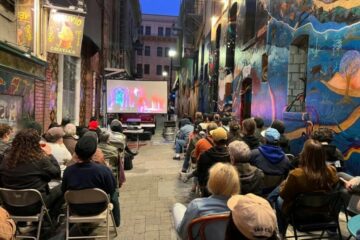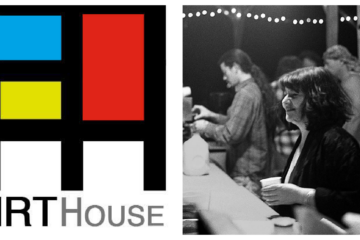The City That Was: A Broke-Ass Business Launch
In The City That Was, Bohemian Archivist P Segal tells a weekly story of what you all missed: the days when artists, writers, musicians, and unemployed visionaries were playing hard in the city’s streets and paying the rent working part time.
I’ve always really loved cooking for people, a habit inherited from my Italian family. Over the years, dozens of people said, “If you ever open a restaurant, I want to invest.” It was theoretically a safe promise, because broke bohemians rarely opened actual businesses, even back then.
One day, as I was walking home to 1907, I saw a sign on the window of the commercial space at the southwest corner of McAllister and Baker, a block from the house. I knew it had been a restaurant at one time, so there was a kitchen.
The place was huge, with two walls of windows and stained glass running along the tops. It still had art deco ceiling fixtures and the rudiments of a commercial kitchen. The rent was hundreds of dollars less than my current apartment. I immediately wrote a business plan for Caffe Proust and made a lot of calls: “Do you remember when you said…?”
Nineteen of my arty friends actually had a few thousand bucks to throw in the pot—or a vital skill like carpentry. One of them, Denzil Meyers, became my principal partner, throwing in a few more thousand and signing all the papers. He had sterling credit. He also had frequent flyer miles, and so after we signed the papers, we went to Europe to see how people in Berlin, Venice, Milan, and Prague were doing cafes those days.
Already, in 1999, the blocks around Caffe Proust were full of people in the brand-new tech industry, renting apartments at then-market rates. But there really wasn’t any good place to eat. So people were looking forward to Caffè Proust.
Returning from Europe, we picked up the keys to the café. We wrote quotes from Proust in huge letters on butcher paper and covered the windows, so people going by could say they’d read Proust. The work began, and I kept searching for investment money, which was difficult, because I had already tapped everyone I knew.
I traded shares in the business for carpentry, color consultancy, sign making, and other essential skills. A neighborhood faux finish artist offered to antique the interior as a portfolio piece. Dozens of Cacophonists came and painted walls and helped make decoupage tables. Each table represented a theme from Proust. The Venice table, for example, assembled an old city map, hundreds of images cut from Smithsonians and National Geographics, and calligraphic quotes from Proust about Venice.
We bought chairs for $5 apiece, painted and recovered them. We bought used kitchen equipment at auction and the most rudimentary plates at the restaurant supply. Then we raided everyone’s family storage and got sofas, armchairs, old lamps, mirrors, and bookshelves. I hung my collection of Proust portraits by Alex Segal, Dean Gustafson, Elise Fried, and Lance Alexander, a framed collection of Proust Said That covers, and other art from 1907.
We still had to pay for plumbing and stock the kitchen and bar, and we were perilously near the end of our total net worth. I frantically searched for investors and couldn’t find another. I had raised a ridiculous total of $60K, in very tepid cash, and by the time we’d paid the plumber and stocked the place, we had literally nothing left.
I’d read lots of books about restaurant ownership, and they all said the same thing: you want to have a quarter of a million dollars in the bank for a cushion when you open. We obviously did not. Denzil and I pondered what to do: go for it, or give it up?
We smiled at each other. “Go for it,” he said.
At first, the neighborhood flooded in, and we were quickly close to breaking even. However, six months after we opened, the dot com start-ups fell like dominoes, and the people who had been spending money like it was a renewable resource moved away. Sales were way down. But at least there were apartments available in the neighborhood again.
In spite of the fact that we started with nothing, and lost our affluent client base, we survived. I have never been as broke as those years of being a CEO. But I did rack up a fortune in amazing stories, which I’ll tell you eventually.
The painting of Caffe Proust was a gift from the wonderful painter Dean Gustafson. I took the photos of the Proust quotes on our windows prior to opening. The photo of the sign was by Stuart Mangrum and Scott Beale












